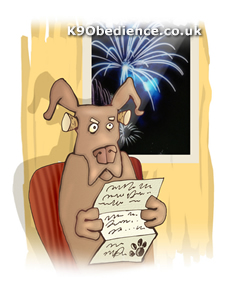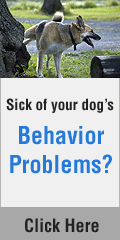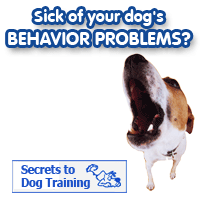|
|
|
Dogs and Fireworks - Fear & Anxiety |
|
| Selected
Article |
 Many dogs are scared of the crashes and bangs made by fireworks. Some are only mildly distressed while others suffer severe anxiety or sheer terror.
Many dogs are scared of the crashes and bangs made by fireworks. Some are only mildly distressed while others suffer severe anxiety or sheer terror.
The dog may pace restlessly, whine or bark, freeze, pant, salivate, tremble, start digging or looking for a place to hide.
In extreme cases the dog may eliminate or vomit.
As much as you may want to cuddle and comfort your dog this will only reinforce the message that the dog was right to be frightened. It is also worth noting that out of the many cases of this we have seen, the great majority (if not all) cases of fireworks anxiety in dogs and puppies are only present due to direct mistakes by the owner themselves, usually done sub-consciously without any idea that the mistake was being made of reinforcing the dog's anxiety about the event.
NEVER show a dog ANY attention of your own on the subject of the fireworks themselves. Do not try in any way to comfort a dog, because this is impossible, it doesn't exist in a dog's mind to have a human 'comfort' them, however good it may feel for us. Dogs can only be 'LED' to believe something can't harm them by you behaving as such, and treating the noises with complete disregard and ideally completely ignoring it.

Your dog will cope much better on its own and in some cases, with owners who just can't stop themselves from trying to 'help' or 'comfort' their dog, we have in the past advised the owner to GO OUT and leave the dog to deal with it on its own, as this is far kinder on a dog than to ask it to understand why its human owner is showing him all this fuss coincidentally at the same time the dog is showing nervousness or anxiety as a result of the fireworks.
There are several things that you can do to reduce the dog's fear of fireworks:
1. Make sure that the dog has had a good long walk during the day. Most of the walk should be off lead with plenty of play and exercise. Before it gets dark, let the dog out into the garden to spend a penny and then close all windows and doors (in a calm way) to minimise the noise as much as possible.
2. Feed the dog cooked rice with a little boiled chicken. This high carbohydrate meal will help to make the dog feel sleepy.
3. Provide your dog with a 'safe' den such as a crate or a cardboard box, or whatever you would normally provide such as a bed or blanket.
4. Get a BIG juicy marrow bone to give the dog something to exert any nervous energy into, as well as occupying the dog's mind. However if your dog is asleep you may wish to withold the bone on the off chance that the dog may sleep through the fireworks, but if it wakes up, simply tell the dog to stay (in your normal voice) and put the bone in front of the dog, then walk away and go about your usual business.
5. Dogs are sensitive to sound and their moods can be influenced by music so turn on the radio, television or play a cd.
6.
Close the curtains or blinds early and turn on the lights.
7. Dog Appeasing Pheromone (DAP) diffuser replicates all the properties of natural appeasing pheromones of the female dog. The nursing bitch releases a substance called pheromones that serve to reassure their young. Plugged into the room where the dog is, the diffuser will calm a panicking dog. It must be plugged in at least a week before to be fully effective.
Most importantly of all, try to do all of the above BEFORE the point where the dog shows signs of distress, and whatever happens, DO NOT lose your own calmness or show ANY emotion whatsoever. The more 'normal' you are (treating it like ANY other day), the more chance your dog has of believing there is no threat and it IS any other normal day!
In severe cases the veterinarian may prescribe a mild sedative or put the dog on a desensitisation programme but please do not dive for this option too early, it should only EVER be a last resort as you can lead your dog to accept many things and fireworks is one of those things which you can easily show your dog that there is no danger posed by them purely by acting normally and resisting any urge to give your dog any more attention than you normally would.
Above all, remember our Cardinal Rule of Dog Training... NEVER Reward Unwanted Behaviour.

|
|
|
|
|
|





